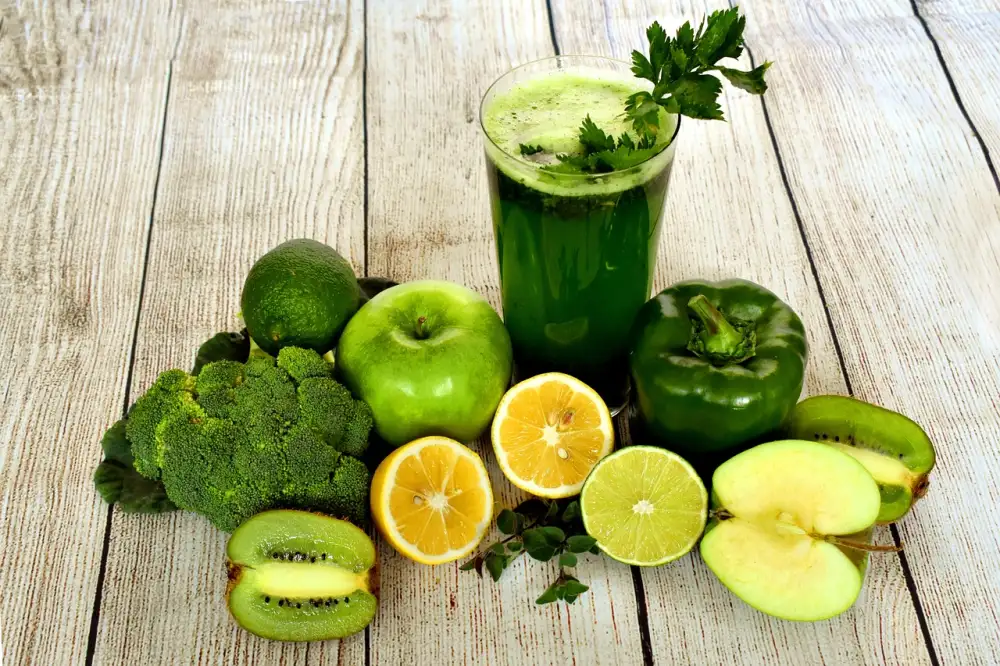Revitalize Your Health: Unlock the Power of a Juice Diet

In today's fast-paced world, where processed foods and unhealthy eating habits have become the norm, it is essential to find ways to revitalize our health. One such way is through the power of a juice diet. A juice diet involves consuming only fresh fruit and vegetable juices for a certain period of time, allowing our bodies to detoxify and rejuvenate from within.
Juice diets have gained popularity in recent years due to their numerous health benefits. By eliminating solid foods and focusing solely on nutrient-rich juices, we can flood our bodies with vitamins, minerals, and antioxidants that are easily absorbed and utilized by our system. This not only boosts our immune system but also promotes weight loss, improves digestion, increases energy levels, and enhances overall well-being.
The beauty of a juice diet lies in its versatility. There are various types of juices that can be incorporated into a juice diet depending on individual preferences and health goals. From green juices packed with leafy greens like spinach and kale to citrus juices bursting with vitamin C, there is a wide range of flavors and nutrients to explore.
Starting a juice diet may seem daunting at first, but with the right approach, it can be an enjoyable journey towards better health. It is important to ease into the diet gradually by replacing one meal or snack with a fresh juice initially. As your body adjusts, you can gradually increase the number of juice meals until you reach your desired duration for the full juice cleanse.
To ensure success during a juice diet, it is crucial to plan ahead and prepare your ingredients in advance. Stock up on fresh fruits and vegetables, invest in a good quality juicer or blender, and experiment with different combinations to find your favorite flavors. Additionally, staying hydrated by drinking plenty of water throughout the day will help flush out toxins from your body.
While a juice diet offers numerous benefits for revitalizing your health, it is essential to approach it with caution. Some potential risks include nutrient deficiencies, unstable blood sugar levels, and a decrease in muscle mass. It is advisable to consult with a healthcare professional before embarking on a juice diet, especially if you have any underlying health conditions or are taking medications.
In conclusion, embracing the juice diet can be a transformative experience for your overall well-being. By unlocking the power of fresh juices, you can revitalize your health, boost your immune system, and achieve a healthier lifestyle. Remember to listen to your body, take necessary precautions, and enjoy the journey towards a more vibrant and energetic you.
Benefits of Juice Diet for Health
The Juice Diet offers numerous benefits for your health. Firstly, it provides a concentrated dose of essential vitamins, minerals, and antioxidants that are easily absorbed by the body. This helps to strengthen the immune system, boost energy levels, and promote overall well-being. Additionally, the high water content in juices helps to hydrate the body and flush out toxins. The Juice Diet can also aid in weight loss as it is low in calories and fat while being rich in nutrients. Moreover, consuming fresh fruits and vegetables in juice form can improve digestion and promote healthy skin. By incorporating a variety of fruits and vegetables into your juice diet, you can enjoy these incredible health benefits while savoring delicious flavors.
Types of Juices for a Juice Diet
When it comes to a juice diet, the options are endless. There is a wide variety of juices that you can incorporate into your diet to reap the maximum benefits. Here are some popular types of juices for a juice diet:
1. Green Juices: These juices are made from leafy greens like spinach, kale, and cucumber. They are packed with vitamins, minerals, and antioxidants that help detoxify the body and boost energy levels.
2. Citrus Juices: Orange, grapefruit, and lemon juices fall under this category. They are rich in vitamin C and can help improve digestion, strengthen the immune system, and promote healthy skin.
3. Beetroot Juice: This vibrant red juice is known for its high iron content and ability to cleanse the liver. It also helps lower blood pressure and improves stamina.
4. Carrot Juice: Carrot juice is loaded with beta-carotene, which converts into vitamin A in the body. It promotes healthy vision, boosts immunity, and enhances skin health.
5. Berry Juices: Blueberries, strawberries, raspberries - these antioxidant-rich fruits make delicious and nutritious juices. They support brain health, fight inflammation, and improve heart health.
6. Watermelon Juice: Refreshing and hydrating, watermelon juice is perfect for hot summer days. It aids in hydration, promotes weight loss due to its low calorie content, and improves cardiovascular health.
Remember to choose organic fruits and vegetables whenever possible to avoid pesticides and chemicals in your juices. Experiment with different combinations of fruits and vegetables to find your favorite flavors while ensuring a well-rounded nutrient intake during your juice diet journey.
How to Start a Juice Diet
Starting a juice diet requires some planning and preparation. Here are a few steps to help you get started:
1. Set your goals: Determine why you want to start a juice diet. Whether it's for weight loss, detoxification, or simply improving your overall health, having a clear goal will keep you motivated throughout the process.
2. Choose the right juicer: Invest in a good quality juicer that can extract maximum nutrients from fruits and vegetables. Look for one that is easy to clean and has different speed settings for various produce.
3. Stock up on fresh produce: Fill your refrigerator with an assortment of fruits and vegetables. Opt for organic options whenever possible to avoid pesticides and chemicals.
4. Plan your meals: Create a schedule for your juice consumption throughout the day. Aim for 4-6 juices per day, spacing them out evenly to maintain energy levels.
5. Start with simple recipes: Begin with basic juice recipes that include common ingredients like apples, carrots, spinach, and cucumbers. As you become more comfortable, experiment with different combinations and flavors.
6. Stay hydrated: In addition to consuming juices, it's important to drink plenty of water throughout the day to stay hydrated and support the detoxification process.
7. Listen to your body: Pay attention to how your body responds to the juice diet. If you experience any discomfort or adverse effects, consult a healthcare professional.
Remember, starting a juice diet is not about deprivation but nourishing your body with essential nutrients in liquid form. With proper planning and commitment, you can embark on this journey towards better health and vitality!
Tips for a Successful Juice Diet
1. Choose fresh, organic fruits and vegetables: Opt for locally sourced produce to ensure maximum nutritional value and minimize exposure to pesticides.
2. Experiment with flavors: Mix different fruits and vegetables to create a variety of flavors and prevent boredom during your juice diet.
3. Stay hydrated: In addition to consuming juices, it's important to drink plenty of water throughout the day to stay hydrated and support the detoxification process.
4. Listen to your body: Pay attention to how you feel during the juice diet. If you experience any discomfort or unusual symptoms, consult a healthcare professional.
5. Ease into and out of the diet: Gradually introduce juices into your daily routine before fully committing to a juice-only diet. Similarly, slowly reintroduce solid foods after completing the juice diet.
6. Stay active: Engage in light exercises such as walking or yoga during the juice diet to maintain muscle tone and support overall well-being.
7. Seek support: Join online communities or find a buddy who is also following a juice diet for motivation, tips, and recipe ideas.
Remember, consult with a healthcare professional before starting any new dietary regimen, especially if you have any underlying health conditions or are taking medications.
Potential Risks and Precautions of Juice Diet
While a juice diet can offer numerous health benefits, it is important to be aware of potential risks and take necessary precautions. Firstly, a juice diet may not provide all the essential nutrients your body needs, such as protein and healthy fats. It is crucial to ensure you are still getting these nutrients from other sources.
Another risk is the potential for nutrient imbalances. Certain juices may be high in certain vitamins or minerals while lacking others. This can lead to an imbalance in your nutrient intake, which may have negative effects on your health.
Additionally, a juice diet can be low in fiber. Fiber plays a vital role in digestion and helps maintain bowel regularity. Without enough fiber, you may experience digestive issues such as constipation.
It is also important to note that a juice diet may not be suitable for everyone. Those with certain medical conditions such as diabetes or kidney disease should consult their healthcare provider before starting a juice diet.
To minimize risks, consider incorporating whole fruits and vegetables into your juice blends instead of relying solely on juicing. This way, you can still benefit from the fiber content while enjoying the nutritional advantages of fresh juices.
Lastly, it is crucial to listen to your body during a juice diet. If you experience any adverse effects or feel unwell, it is important to stop the diet and seek guidance from a healthcare professional.
By being aware of these potential risks and taking necessary precautions, you can safely embrace the power of a juice diet for improved health and well-being.
In conclusion, the juice diet is a powerful tool to revitalize your health and unlock the magic of food. By incorporating fresh, nutrient-rich juices into your daily routine, you can experience numerous benefits such as increased energy levels, improved digestion, glowing skin, and weight loss.
With a wide variety of juices to choose from, you can customize your juice diet based on your preferences and health goals. Whether you opt for green juices packed with leafy greens or refreshing fruit-based juices, each sip will nourish your body with essential vitamins, minerals, and antioxidants.
Starting a juice diet is simple. Begin by replacing one meal or snack with a homemade juice and gradually increase the number of juice meals per day. Remember to include a variety of fruits and vegetables to ensure you receive a diverse range of nutrients.
To ensure success on your juice diet journey, it's important to stay hydrated, listen to your body's hunger cues, and seek professional guidance if necessary. Additionally, incorporating regular exercise and maintaining a balanced lifestyle will further enhance the benefits of the juice diet.
While the juice diet offers numerous health benefits, it's important to be aware of potential risks such as nutrient deficiencies and blood sugar imbalances. It's advisable to consult with a healthcare professional before starting any new dietary regimen.
Embrace the power of the juice diet and embark on a journey towards a healthier lifestyle. Let every sip of fresh juice bring vitality and nourishment into your life. With dedication and mindful choices, you can unlock the magic of food through this rejuvenating practice. Cheers to vibrant health!
Published: 18. 12. 2023
Category: Health



